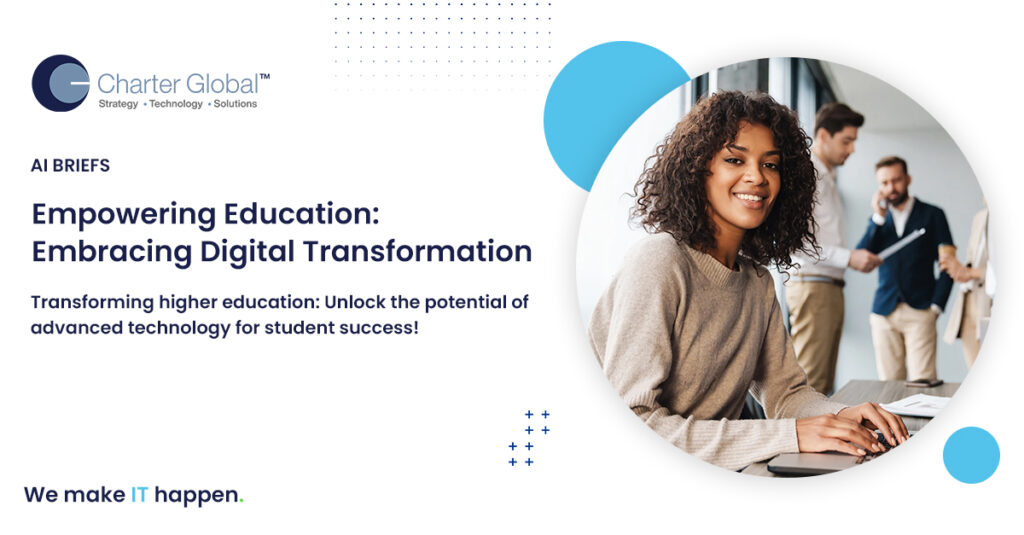Higher education professionals must familiarize themselves with Artificial Intelligence (AI) and related concepts to stay current and relevant in their field. Failing to do so could result in missed opportunities and a disconnect from their student demographics. Institutions of higher learning that invest time in understanding the breadth of AI capabilities stand to benefit in various ways. These advantages include maximizing resources, offering students tailored experiences and utilizing predictive capabilities to attract a more diverse and suitable pool of campus applicants.
As part of our AI insights series, we’ll delve into the pivotal role AI plays in reshaping Higher Education, exploring vast potential, current applications and benefits it can provide. Moreover, we’ll navigate through the challenges and considerations in adopting AI, offering strategies for successful implementation.

Higher education is a dynamic sector, constantly adapting to societal, economic, and technological shifts. However, it faces several challenges, including rising costs, increasing competition and the need to deliver quality education effectively. Traditional approaches are no longer sufficient in addressing these complexities, prompting the exploration of AI solutions. From streamlining administrative tasks to personalizing learning experiences, AI can contribute significantly to educational experiences. By leveraging machine learning algorithms, natural language processing and data analytics, institutions can optimize processes, enhance decision-making, and improve outcomes for students and staff alike.
According to a UiPath survey, organizations worldwide recognize the burden of repetitive tasks on their administrative teams, with employees losing about 4.5 hours weekly to mundane work that could be automated. To address this, integrating AI into administrative processes can help identify areas for automation and pilot AI advancements to optimize efficiency.
In higher education, the debate over unbiased admissions processes intensified after a Supreme Court ruling on affirmative action. However, AI-powered admissions offer a holistic solution by evaluating candidates based on diverse criteria aligned with institutional objectives, bypassing biases inherent in traditional methods. This fosters a fairly-selected and more diverse student body. Personalization has become essential in education, mirroring consumer expectations for improved experiences. AI tools streamline administrative tasks, like paperwork and identifying at-risk students, while also assisting faculty with grading and reporting. For instance, Ivy Tech leveraged AI algorithms to predict student performance early in the semester, enabling interventions that significantly improved pass rates for thousands of students.
There are many advantages of integrating AI into higher education. Some examples include:
These are only a few of the opportunities and efficiencies higher education can pursue.
The potential of AI in higher education is undeniable, yet institutions must navigate several critical factors before diving into implementation. Resistance to change, a shortage of expertise, and concerns over data privacy are but a few items that can impede AI adoption. Integrating AI solutions with established infrastructure and workflows poses its own set of challenges, often requiring significant time and resources.
These obstacles are not insurmountable. While AI has the potential to transform many aspects of higher education, careful consideration of ethical, technical and practical considerations is essential to ensure its effective and equitable implementation.
AI holds immense promise for higher education, offering unprecedented opportunities to enhance learning experiences, optimize administrative processes and provide personalized user support. Whether a small liberal arts college or a large research university, embracing AI can position your institution for success in an ever-evolving educational landscape.
At Charter Global, our team of experts can help you envision a host of ways to add value to your institution using AI. AI can revolutionize university operations, elevate the experiences of students, faculty, and staff, and foster a culture of trust within your institution. If you’re interested in discovering how AI can revolutionize your academic institution, Contact Us today.